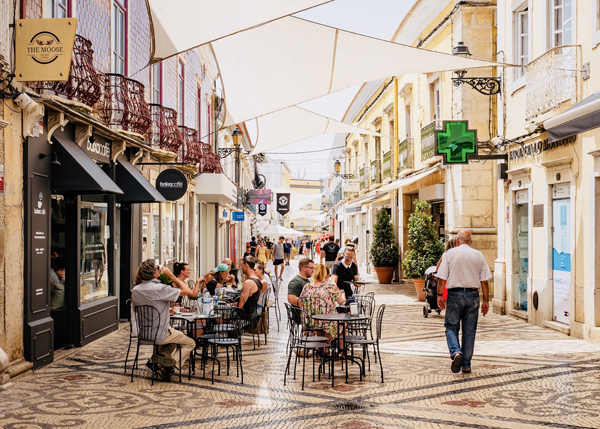Retire in Faro Guide
Summary: Retire in Faro with confidence, armed with the knowledge from our extensive guide. It covers critical considerations for retirees, from the cost of living and climate to housing, healthcare, and residency choices in Faro. We also delve into the social and cultural scene, volunteering options, public transportation facilities, and the city's walkability, helping you make an informed decision.

Retiring in Faro is a dream come true for many international retirees. The city offers a unique blend of stunning natural beauty, rich history, and a relaxed lifestyle. The cost of living is relatively low compared to other European countries, and the climate is pleasant throughout the year. However, like any other place, retiring in Faro also comes with its own set of challenges, such as language barriers and understanding the local customs and laws.
Cost of Living in Faro
The cost of living in Faro is one of the main attractions for retirees. It is significantly lower than in many other European cities. A comfortable lifestyle can be maintained on a modest budget. Rent for a one-bedroom apartment in the city center is around €600 per month, while outside the city center it drops to around €500. Groceries, utilities, and healthcare are also reasonably priced.
Climate
Faro boasts a Mediterranean climate, with hot summers and mild winters. The average temperature in summer ranges from 25°C to 30°C, while in winter it rarely drops below 10°C. This pleasant weather allows retirees to enjoy outdoor activities throughout the year.
Healthcare
Portugal has a high standard of healthcare, and Faro is no exception. The city has several well-equipped hospitals and clinics, and many doctors speak English. The proximity to good healthcare facilities is a major advantage for retirees.
Public Healthcare System
Portugal's public healthcare system is accessible to all residents, including international retirees. However, many retirees opt for private health insurance for faster service and wider coverage. It's important to research and understand the healthcare options before making a decision.
Residency Options
Portugal offers a variety of residency options for retirees. The most popular is the Non-Habitual Resident (NHR) program, which offers tax benefits for a period of ten years. Another option is the Golden Visa program, which offers residency in exchange for an investment in the country.
Recreational Activities
Faro is a paradise for nature lovers. The city is surrounded by the Ria Formosa Natural Park, a haven for birdwatchers. The city's marina is a hub for water sports, and there are several golf courses in the vicinity. Faro also has a rich cultural scene, with numerous museums, art galleries, and historical sites.
Restaurants
Faro offers a wide range of dining options. Some popular local restaurants include A Venda, a traditional Portuguese restaurant, and O Gimbras, known for its seafood. For a more upscale dining experience, Restaurante Ria Formosa offers stunning views of the marina.
Language Learning
While many locals in Faro speak English, learning Portuguese can enhance the retirement experience. The University of the Algarve offers Portuguese language courses for foreigners.
Local Culture
The locals in Faro are known for their hospitality and friendliness. The city has a relaxed pace of life, with siestas in the afternoon and late dinners. The local market, Mercado Municipal, is a great place to experience the local culture and cuisine.
Meeting People and Volunteering
Meeting new people is easy in Faro, with numerous clubs and organizations catering to retirees. Volunteering is also popular, with opportunities available at local charities and community centers.
Housing
Most retirees in Faro live in apartments or villas. The city center is popular for its proximity to amenities, while the outskirts offer more space and tranquility. Some popular neighborhoods for retirees include the Old Town and the Marina.
Transportation
Faro has an efficient public transportation system, and most places are within walking distance in the city center. However, having a car can be useful for exploring the surrounding areas.
Retiring in Faro, Portugal offers a unique blend of relaxation and adventure. With its affordable cost of living, pleasant climate, and friendly locals, it's no wonder that the city is a popular choice for international retirees.
About the Author
 Betsy Burlingame is the Founder and President of Expat Exchange and is one of the Founders of Digital Nomad Exchange. She launched Expat Exchange in 1997 as her Master's thesis project at NYU. Prior to Expat Exchange, Betsy worked at AT&T in International
and Mass Market Marketing. She graduated from Ohio Wesleyan University
with a BA in International Business and German.
Betsy Burlingame is the Founder and President of Expat Exchange and is one of the Founders of Digital Nomad Exchange. She launched Expat Exchange in 1997 as her Master's thesis project at NYU. Prior to Expat Exchange, Betsy worked at AT&T in International
and Mass Market Marketing. She graduated from Ohio Wesleyan University
with a BA in International Business and German.
Some of Betsy's articles include 12 Best Places to Live in Portugal, 7 Best Places to Live in Panama and 12 Things to Know Before Moving to the Dominican Republic. Betsy loves to travel and spend time with her family. Connect with Betsy on LinkedIn.
Additional Information:
- Retire in Faro Guide
- 7 Tips for Living in Faro
- Pros & Cons of Living in Faro
- Tips for Expats Driving in Faro
- Health Care in Faro
- The Essential Guide to Faro
- Cost of Living in Faro
- Healthcare & Health Insurance in Portugal
- Best Places to Live in Portugal
- Real Estate in Portugal
- Do I need Health Insurance When Moving to Portugal?
- Pros and Cons of Living in Portugal 2024
- 2024 Guide to Moving to Portugal
- More Advice about Retiring in Portugal

 Faro, Portugal
Faro, Portugal


